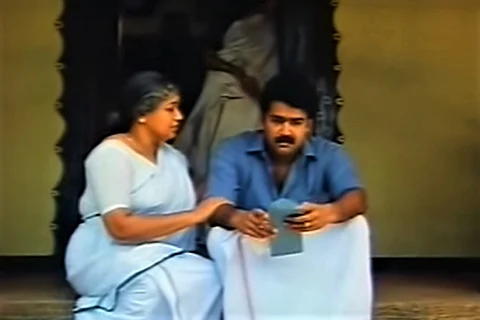

He has just been beckoned by his elder brother, offered a chair even, in a rare show of deference. It’s to sign a document required to sell a joint property. Yet Aniyan Thampuran looks unusually pleased – he feels wanted. Someone needs him. It’s this long held desire to feel wanted that has been satisfied. That moment signifies Aniyan Thampuran’s whole life.
Directed by Bharath Gopi and written by John Paul, Ulsavapittennu (1988) is placed in an old Namboothiri tharavadu in central Kerala that has seen better days, but its inhabitants still live in their own superficial world of kingship and glory. The elder brother, who is squandering his wealth to restore their past grandeur. His wife, who is still bewitched by the aura of wealth bequeathed to her and procrastinates with a book and lots of gossip. An ageing kind caretaker, who is a mute spectator to the changing fortunes of the tharavadu. The scheming help, who is there only to partake in the money thrown at him. And the lonely young Thampuran, who is treated with disdain by the people around him.
The film does unleash its share of tropes associated with royalty and ‘upper’ caste Hindu families on celluloid. Their prevailing notions of superiority and casteism, derision for those beneath them, powerplay at temples, misogyny and their unapologetic lasciviousness. The women are either black or white. Ravi Thampuran’s wife, painted as a greedy, gossipmonger has to compete with the gentle, smiling, hardworking ageing caretaker/maid (who else but Kaviyoor Ponnamma!), while Ravi’s paramour is gossipy (ironical that she befriends Ravi’s wife for that) and even makes a play for the younger brother. Then there is the pristine, educated, dignified wife of Aniyan who would rather be penniless than be called a troublemaker.
There is the usual depiction of unequal marriages where a woman is saved by the man through a benevolent gesture of accepting her as his wife. The cliché of the karyasthan, his greed, and a daughter who falls for the Thampuran.
About the Thampuran
What really holds the film together is the timid, lovable Aniyan Thampuran, played by Mohanlal. The young Thampuran seemed like a subversion of the actor’s own futuristic feudal landlords, that is, the Induchoodans and Mangalasseri Neelakandans. In one scene, he rushes to where a hut is being demolished and gently orders them to stop it, only to be admonished later by his brother for the silly interference. In another moment, he requests a policeman to bail out a thief, but on realising his folly not only does he admit to it but also wonders whether he can be jailed again. All situations Renjith’s alpha males would have finished in one clean sweep of a fist fight.
Aniyan’s is a well-written character – a young man who still misses his mother, who feels unwanted, unloved and often curses being born in the tharavadu. A school dropout, it’s not clear why he is treated the way he is. Probably his childlike naivety and honesty clashes with his Thampuran image that has resulted in him not being taken seriously. In a world where gentleness and sensitivity in a man is often seen as a weakness, it’s no wonder Aniyan stands cornered.
And that results in a lot of goodness in the man who is overlooked. His humanity and his ability to treat everyone equally. When his friend belonging to another caste elopes with a Namboothiri girl, Aniyan welcomes it. He is that kind, guileless soul who apologises to his wife’s former lover for unintentionally standing between them.
The quiet romance between Aniyan and Karthika is organic and moving, although the conversation during their wedding where he indulges in a game of limericks seems a bit odd.
Aniyan’s characterisation goes through various upheavals but remains the same old kind spirit at heart. Mohanlal brings this incredible innocence to his body language, with a smile that has the power to make a baby chortle.
The brother and others
Sukumaran who plays Ravi Thampuran brings a dignity to this act, his relationship with Aniyan is complex yet with an offhand affection to it. His character deserved better closure than that hurried death. Devan, a professor-turned-writer, ought to be the most overused cinematic symbol of the thinking, introverted writer. The one who drops reflective one-liners and mourns a lost lover.
Parvathy is one actor who remains a director’s primary choice to play the sacrificial, gentle, beauteous wife, more so if they are from the valluvanadan belt. There is this disarming naturalness that she displays as Karthika – even her silence speaks volumes.
The end
Spoiler alert
Any mention of Ulsavapittenu is incomplete without that heartbreaking climax where Aniyan, distraught after his brother’s death and finding himself at odds with the world, decides to end his life. And that scene where he swings from the tree, lugging the rope around his neck, all the while maintaining the conversation with the children witnessing it is an image that is difficult to shake off even today.
Paradoxically, even in death, Aniyan Thampuran never lost the child in him.
This article was originally published on Fullpicture.in. The News Minute has syndicated the content. You can read the original article here.